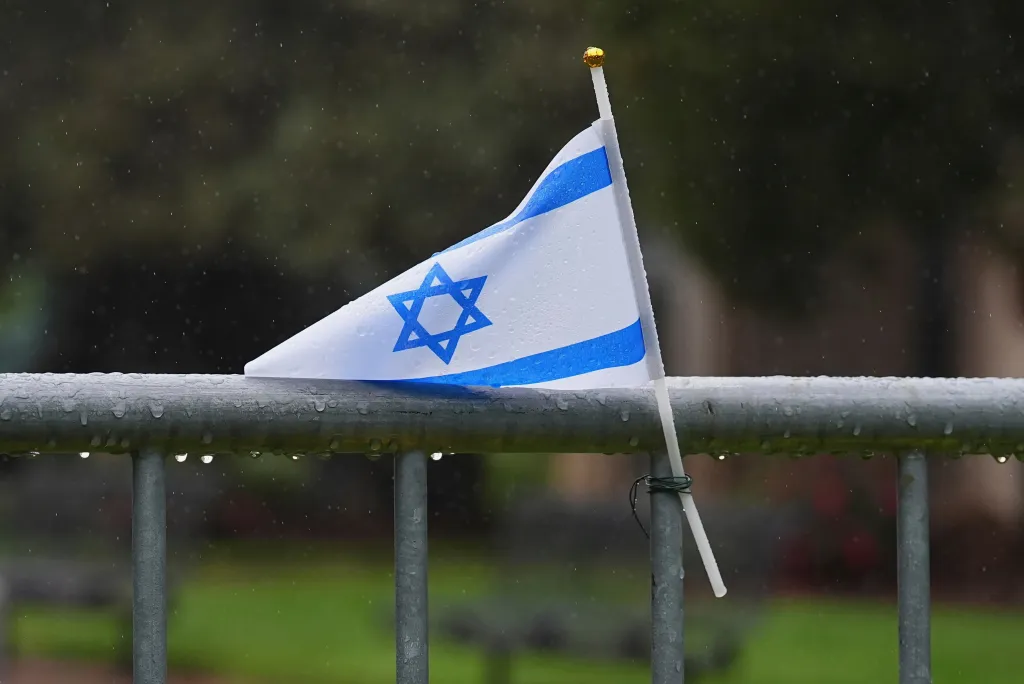
This week, in a conversation about safety concerns for Jews in her community, an elected official in Massachusetts told me that if she was killed because of her Jewish identity, she would die knowing that she had stood up for what she believed in – but she did not want to be murdered in front of her children.
In another conversation, a fellow Jewish professional told me that he and his wife decided that only one of them would attend a Jewish event because they still had a child in high school and would need at least one parent if the event was attacked.
Earlier this spring, I was harassed and needed a police escort to safely leave a city council meeting in my hometown of Somerville after speaking out against a ballot question that discriminates against Jewish and Israeli businesses and makes Jewish residents less safe.
This level of fear and danger for Jewish Americans is not normal – and we cannot let it be normalized.
On June 1, an otherwise peaceful Jewish gathering in Boulder, CO to raise awareness for the 58 hostages still in Gaza was firebombed by an attacker who allegedly stated that he wanted to “kill all Zionist people” and “Free Palestine.” Fifteen people were injured, many seriously, including an 88-year-old Holocaust survivor. Just three weeks earlier, Yaron Lischinsky and Sarah Milgrim were senselessly murdered in a heinous attack at the Capital Jewish Museum in Washington, D.C., by an extremist who also allegedly yelled “Free, Free Palestine.”
Their only crime was attending a Jewish event.
Violence against Jews does not and never will do anything to “free Palestine”.
Over the past five years, the rate of antisemitic incidents in Massachusetts has surged over 500%. The 2024 ADL Audit of Antisemitic Incidents reported 438 incidents across108 cities and towns in the Commonwealth, a figure that remains high following a spike after the Hamas-led massacre in Israel on Oct. 7, 2023. For the first time, more than 50% of incidents were Israel-related, where protestors and perpetrators spewed lies, blood libels, and incitement to violence like “By any means necessary” and “globalize the Intifada.”
The murder and firebombing of Jews here in the U.S. is exactly what “globalize the Intifada” means.
Out of 50 states, Massachusetts ranked third nationally for campus antisemitism. At MIT, protesters occupied spaces with signs equating Zionism with Nazism, chanting slogans calling for Israel’s elimination. At Harvard, Jewish students report exclusion from campus spaces and activities based on support for Israel. At a Tufts student government meeting to discuss anti-Israel resolutions, Jewish students were spat on and harassed and told to “Go back to Israel, we don’t want you here.”
Some students have shared that in order to participate in campus life, they feel they must hide their Jewish identity.
Swastikas were graffitied 87 times last year, traumatizing communities. Synagogues and Jewish organizations faced coordinated bomb threats, creating disruption and concern for congregants and requiring extensive law enforcement responses. There was also a 150% increase in incidents targeting visibly Orthodox Jews, including one where an individual yelled “Death to all Jews” at a mother and her children.
Each antisemitic incident leaves lasting scars on the individuals and communities who were affected, creating ripple effects that extend far beyond the immediate victims.
Together, we need to confront antisemitism wherever it appears – in schools, neighborhoods, workplaces, and online spaces. We need our government leaders to lead. This means developing a robust statewide strategy that condemns antisemitism as a unique form of hate. They must also speak out forcefully and unequivocally against antisemitism, regardless of its origins. Selective condemnation sends a message that some forms of Jewish hatred are acceptable.
School administrators need to adopt clear frameworks to address antisemitism in schools, providing resources for reporting and responding to incidents, and promoting education and awareness to prevent the spread of hate, including comprehensive lessons on the Holocaust and its implications for understanding antisemitism today.
Our law enforcement should receive specialized training so they can recognize and respond to antisemitic hate crimes.
And all of us need to push back on the antisemitic Boycott, Divestment, and Sanctions (BDS) movement in Somerville and everywhere it rears its ugly head. Aiming to delegitimize Israel, the BDS movement uses tactics that bring division and rancor to every community and institution they have targeted, undermining the principles of engagement, tolerance, dialogue and coexistence.
Last week, the FBI and Department of Homeland Security warned of an “elevated threat” facing the Jewish community saying that “the ongoing Israel-HAMAS conflict may motivate other violent extremists and hate crime perpetrators with similar grievances to conduct violence against Jewish and Israeli communities and their supporters.”
Your Jewish friends and neighbors are feeling demoralized and scared. Please stand with us. Speak out against antisemitism. Stop excusing it. Stop justifying it. Stop looking the other way. Say something.
Our lives may depend on it.
Samantha Joseph is the ADL New England Regional Director